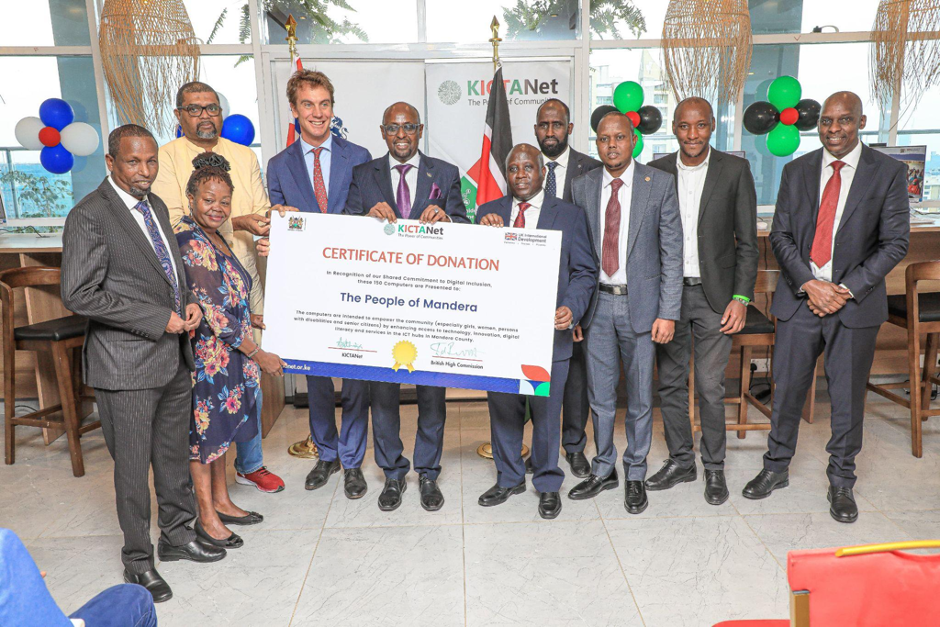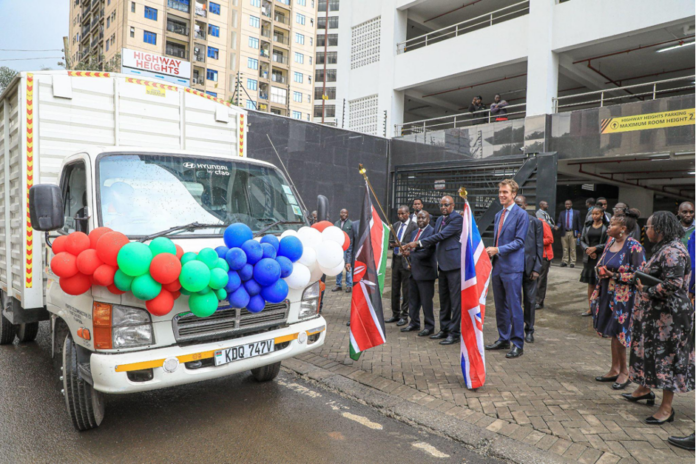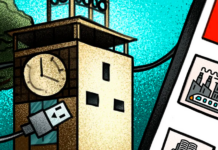By Arasha Soila, Nairobi
The UK Government, in partnership with KICTANet, handed over 150 computers to Mandera County to enhance digital inclusion and empower local communities. This initiative, under the UK’s Digital Access Programme (DAP) and the Strengthening Digital Communities Project, aims to bridge the digital divide and contribute to Kenya’s vision of a digitally empowered nation.
The computers equipped with accessibility features and assistive software will be distributed to digital hubs across Mandera County, will enhance digital access to all particularly girls, women, persons with disabilities and senior citizens.
According to a 2022 report by the Kenya National Bureau of Statistics (KNBS) reveals a stark disparity with only 11% of persons with disabilities using the internet, compared to 22.9% of the non-disabled population.
Further, a 2024 report by KictaNet titled “Best Practices for Digital Inclusion of Persons with Disabilities (PWDs) in Kenyan Community Networks” states that persons with disabilities in Kenya are less likely to use mobile phones and mobile internet compared to those without disabilities, exacerbating their social exclusion, especially in the highly digital post-pandemic world. For women with disabilities, this issue is compounded by an intersectional gap, as they are even less likely to use mobile internet than men with disabilities.
Speaking during the flag-off ceremony, the PS, State Department of Information, Communication and Digital Economy highlighted that technology is a great enabler for economic growth noting that these computers will provide solutions to those with visual and hearing impairments and can now access over 22,000 services on e-citizen.
 He lauded KictaNet and the partners for bridging the digital gap among people living with disabilities. “We have seen people here with hearing and sight impairments now able to access tools and services from the government and navigate the digital space conveniently. We will commit to support you and see how we can facilitate and address some of the issues raised,” he reiterated.
He lauded KictaNet and the partners for bridging the digital gap among people living with disabilities. “We have seen people here with hearing and sight impairments now able to access tools and services from the government and navigate the digital space conveniently. We will commit to support you and see how we can facilitate and address some of the issues raised,” he reiterated.
David Mugonyi, Director General of the Communications Authority (CA), emphasized the importance of extending internet connectivity to marginalized communities. “This initiative, as all of you know, is meant to ensure digital access and inclusion, and the mere fact that you have chosen Mandera, tells us a lot of what you are thinking about giving access to technology and internet to the less privileged in society, those who are marginalized,” Mugonyi stated.
During the event, Deputy Governor Dr. Ali Maalim expressed his gratitude, stating that the program will offer multilingual resources to facilitate learning aiming to contribute significantly to the society.
“This program—aimed at fostering digital inclusion for marginalized groups, including women, girls, persons with disabilities, and senior citizens—has already impacted over 1,000 youths across Mandera County. With these computers, our ICT hubs will become vibrant centers for online learning, remote employment, and innovation. In an era where technology drives progress, this initiative will dismantle barriers, enabling our youth to compete globally and thrive in the digital economy,” he noted.
KictaNet CEO Grace Githaiga, said that the initiative focuses on improving digital skills including training 10,000 community digital champions who will cascade the training to 5000 citizens through direct contact contributing to Kenya’s target of reaching 20 million digitally literate citizens.
“By providing access to devices and through digital skills training, we are empowering historically marginalized and digitally excluded communities to participate in the digital economy and to enhance their livelihoods,” she concluded.
“Persons with Disabilities are at the center of UK DAP focus. Under the ongoing project, we have trained over 161 deaf persons (57 Mandera and 94 in Busia) in using a mobile application to access on the spot Sign Language Interpreters in Busia and Mandera, 314 Persons with Visual Impairment (85 in Mandera and 244 in Busia) and loaded Assistive Software to some computers in Busia (6 pieces) and Mandera (10 pieces),” reaffirmed the Deputy High Commissioner. He continued by saying that counties need to support continued practice and access to essential services.
The Deputy High Commissioner also noted that the UK Digital Access Programme, has scaled the project to seven other Counties including Nakuru, Nairobi and Mombasa implemented through the British Council and Garissa, Wajir, Turkana and Elgeyo Marakwet through the African Centre for Women in Information Communications and Technology (ACWICT).














